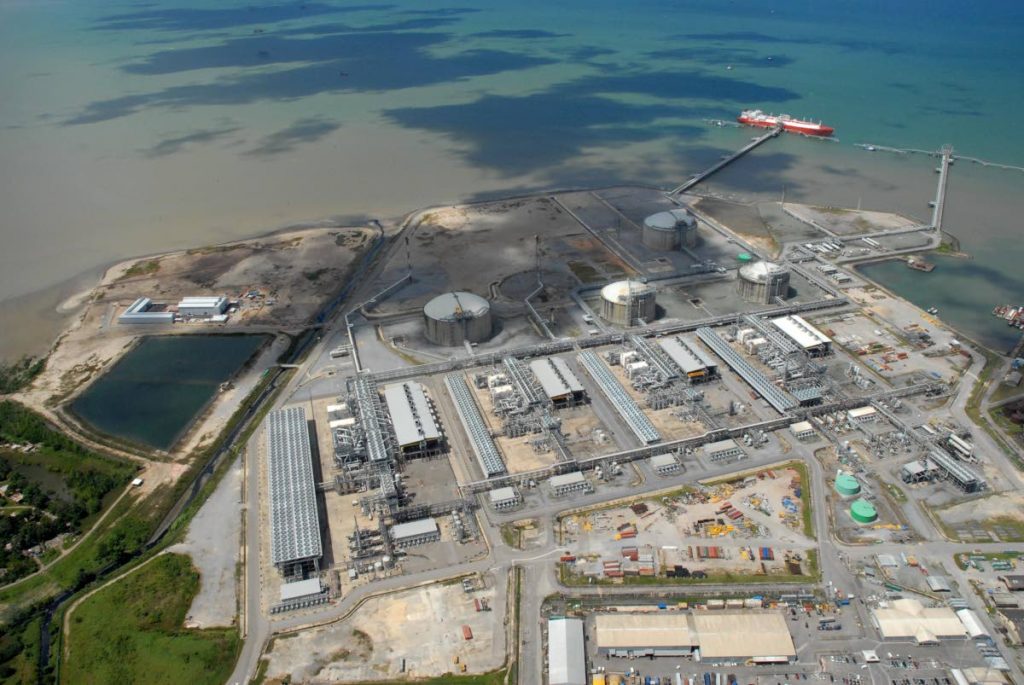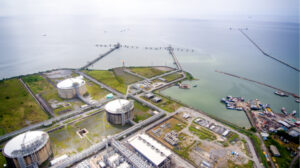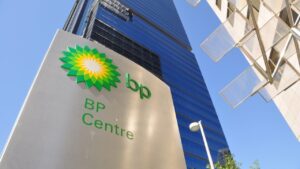
(Trinidad Express, 18.Jul.2021) — No definitive decision has as yet been taken to mothball Atlantic Train I, industry insiders have said.
According to these insiders, reports of the plant being mothballed should be seen as part of the ongoing fight between BP and Royal Dutch Shell, two of the world’s largest energy companies, for control of the still lucrative liquefied natural gas (LNG) complex at Point Fortin.
The well-placed industry insiders say the proposal by Shell to have one single ownership structure for all four LNG producing trains at Atlantic—instead of the current situation in which each of the four LNG-producing facilities have different shareholdings and shareholders—would strengthen Shell’s control over Atlantic and reduce BP’s.
Shell owns 46 per cent of Train I, 57.5 per cent of Trains II and III and 51.11 per cent of Train IV. Shell became the largest shareholder in Atlantic through its acquisition of the T&T LNG assets of Spanish energy giant, Repsol, in January 2014, and by purchasing the BG Group in February 2016.
BP, on the other hand, owns 34 per cent of Train I, 42.5 per cent of Trains II and III and 37.78 per cent of Train IV. Wholly State-owned National Gas Company (NGC) owns 10 per cent of Train I and 11.11 per cent of Train IV, while the China Investment Corporation only owns 10 per cent of Train I.
Although Shell is the clear majority shareholder in Trains II, III and IV, and the largest shareholder in Train I, the Anglo-Dutch energy giant’s natural gas production in T&T for 2020 averaged 604 million cubic feet per day, while BP averaged 1.673 billion cubic feet per day, according to the Ministry of Energy website. The industry insiders said about 70 per cent of BP’s natural gas output in 2020 went to Atlantic, which is about an average of 1.171 billion cubic feet a day. This means BP supplied about 71 per cent of Atlantic’s average natural gas intake of 1.645 billion cubic feet of gas last year.
The insiders point out that BP is the country’s largest producer of natural gas, by far, and that the London-headquartered company has long argued that bringing Atlantic under a single ownership structure (called unitisation) would not reflect that reality. BP is said to be insisting that its supply of natural gas to the LNG complex should be reflected in its ownership of Atlantic.
In May 2019, BP announced it would not have enough natural gas to supply Atlantic Train I and the plant may have to close down for at least two years.
“Recent disappointing results from our infill drilling programmes have had a material impact on our forecasted production, especially in 2020 and 2021. This means there are challenges to our supply of gas to Train I after 2019. BP along with Atlantic and its shareholders are working through options for the future of the train,” BP said in a statement at the time.
That statement by BP came weeks after the end of the 20-year natural gas supply contract for Train I. The industry insiders expressed “continuing surprise” that BP has not done anything to address the infill drilling issues it experienced in 2019.
One industry insider said: “NGC is a 10 per cent shareholder in Train I. If the decision is to mothball that plant for two years, then the board of Atlantic must decide to use the maintenance reserve for that purpose. NGC does not have a separate responsibility in this regard.” The maintenance reserve is a fund sequestered from profits that is used on the finance planned turnarounds and unplanned repairs.
The insiders said for NGC, with its 10 per cent stake in Train I, to have offered to pay for the 2020 turnaround would have meant both Shell and BP would have vetoed the use of the maintenance reserve to fund the turnaround.
The Ministry of Energy issued a news release on Saturday stating Government has been in discussions with all of the shareholders of Atlantic LNG for months with respect to the future of Atlantic LNG and that “these discussions are ongoing and at a very sensitive stage.”
“The Government and the National Gas Company of Trinidad and Tobago (NGC) have ensured that Atlantic is preserved in the best position to allow all options with respect to its future to be available whilst these discussions are ongoing. At all times NGC has acted to protect the rights and position of the Citizens of Trinidad and Tobago,” the release added.
The news release also said it is “noteworthy that BPTT’s Cassia C platform has arrived in Trinidad and Tobago, this will add to current gas production and is a direct result of the Government’s negotiations with BPTT in 2018.” Cassia C is expected to boost BP’s natural gas production by about 500 million cubic feet at peak, when the facility is expected to be commissioned in the first half of 2022. With the commissioning of Cassia C, BP would have enough natural gas to supply to Train I in 2022, so why is the British company signalling that it wants to mothball Train I now for two years… until 2023?
In a statement on Saturday, Opposition MP and spokesman on energy matters, David Lee, called on the Government to tell the country if the million-dollar turnaround on Train I by NGC “was an act to deceive the population and cover up that yet another plant had been crippled due to their mismanagement of the natural gas sector.”
Lee said: “Given the dire economic times facing our citizens, the Government needs to tell the nation who instructed the National Gas Company to spend hundreds of millions of taxpayers’ money on a turnaround when they knew fully well the prevailing gas shortage would hinder the plant.”
____________________

